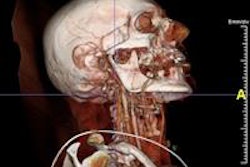Data-mining software that collects patient information on head and neck cancer can be used to guide individualized cancer treatment, according to a study presented at this week's American Association of Physicists in Medicine (AAPM) meeting in Austin, TX.
With the software, called Oncospace, healthcare providers continually input information about cancer patients, ranging from family history, medications, surgical procedures, and test results to specifics about the tumor, treatments, and outcomes, according to the researchers. By aggregating information from all patients, they can then detect patterns, predict the likelihood of side effects, and gather other insights to help design the best plan for each new patient.
Designed by medical physicists, Oncospace may help doctors improve outcomes and decrease side effects for cancer patients, according to the team led by Todd McNutt, PhD, an associate professor of medical physics and director of clinical informatics in radiation oncology at Johns Hopkins University School of Medicine.
In their study, the researchers used information from 513 head and neck cancer patients. They discovered that those who had high doses of radiation delivered to small areas of the larynx, esophagus, and muscles of the throat were more likely to have difficulty swallowing, whereas dry mouth was more likely to occur in patients who had lower doses of radiation to larger areas of the salivary glands, inside the mouth, or the lower jaw. Doctors can now plan for those side effects in new patients or revise radiation treatment plans to minimize risks, according to the group.
The ultimate goal is to use big data to provide personalized medicine, with information from the database helping physicians predict a patient's prognosis, whether he or she is likely to experience side effects, and the success of each treatment, McNutt said in a statement. The best therapy could then be designed for that individual.
Oncospace currently combines real-world information being gathered on an ongoing basis in a registry with research-level data collected in a trial, McNutt said. The researchers are also gathering information on other cancers, including pancreatic and prostate cancer. They said they hope to grow the program and eventually share it with other institutions to compare practices and continually improve treatment.



















